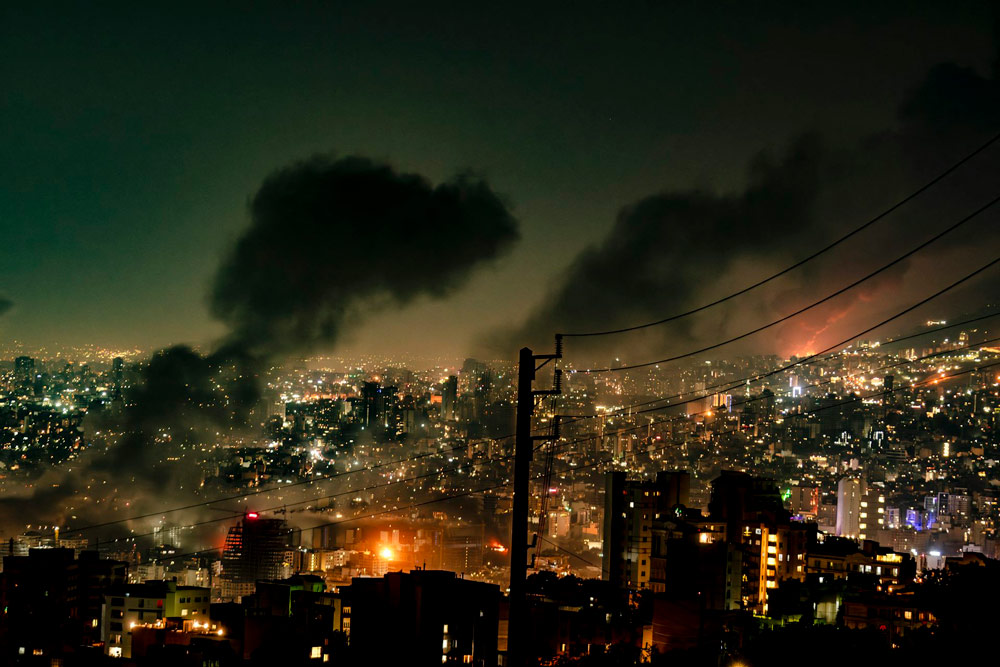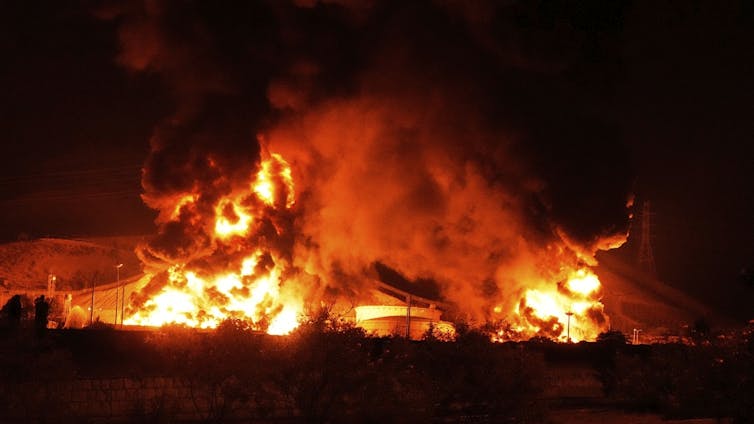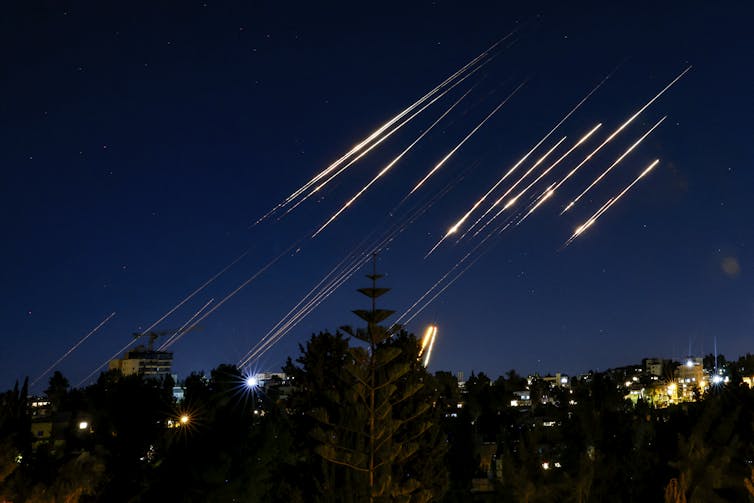
By Farah N. Jan
Israel’s conflict with Iran represents far more than another Middle Eastern crisis – it marks the emergence of a dangerous new chapter in nuclear rivalries that has the potential to reshape global proliferation risks for decades to come.
What began with Israeli strikes on Iranian nuclear facilities and other targets on June 13, 2025 has now spiraled into the world’s first full-scale example of what I as an expert in nuclear security call a “threshold war” – a new and terrifying form of conflict where a nuclear weapons power seeks to use force to prevent an enemy on the verge of nuclearization from making that jump. As missiles continue to rain down on both Tehran and Tel Aviv – with hundreds dead in Iran and at least 24 killed in Israel – the international community is witnessing the collapse of traditional deterrence frameworks in real time.
Unlike traditional nuclear rivalries where both sides possess declared arsenals – like India and Pakistan, who despite their tensions operate under mutual deterrence – this new threshold dynamic creates an inherently unstable escalation spiral. Iran increasingly believes it cannot deter Israeli aggression without nuclear weapons, yet every step toward acquiring them invites more aggressive Israeli strikes. Israel, for its part, cannot permanently eliminate Iran’s nuclear knowledge through military means – it can only delay it through means that would seemingly guarantee future Iranian determination to acquire the ultimate deterrent.
Under this dynamic, neither side can step back without accepting an intolerable outcome: for Israel, an Iran more determined than even in becoming a nuclear weapons nation capable of deterring Israeli action and ending its regional military dominance; for Iran, the risk of regime change through devastating Israeli strikes. The consequences of this deadly logic extend far beyond the Middle East.

AP Photo/Vahid Salemi
The preventive strike precedent
The stakes could not be higher, as Iranian officials have called the attack “a declaration of war” and vowed that destroyed nuclear facilities “would be rebuilt.” Israel, meanwhile has warned its campaign will continue “for as many days as it takes.”
Most ominously, the scheduled nuclear talks between the U.S. and Iran were called off, with Tehran dismissing any such dialogue as “meaningless.” This may suggest diplomacy’s window – which opened for just a few months under Trump’s second administration, after being closed during his first – was deliberately slammed shut.
More broadly, the Israeli strikes mark a dangerous evolution in international norms around preventive warfare. While Israeli officials called this a “preemptive strike,” the legal and strategic reality is different. Preemptive strikes respond to imminent threats – like Israel’s 1967 Six-Day War against Arab armies preparing to attack. Preventive strikes, by contrast, target distant future threats when conditions seem favorable – like Japan’s attack on Pearl Harbor in 1941.
Israel justified its action by claiming Iran could rapidly assemble up to 15 nuclear bombs. Yet, as the International Atomic Energy Agency director, Rafael Grossi, warned beforehand, an Israeli strike could solidify rather than deter Iran’s nuclear ambitions, potentially prompting withdrawal from the Nuclear Non-Proliferation Treaty. True to that warning, on June 16, Iran announced it was preparing a parliamentary bill that would see the country leave the 1968 treaty.
Israel’s calculations in opting to strike build on the same erosion of international legal frameworks that has legitimized preemptive warfare since the United States’ military action in Afghanistan and Iraq after the Sept. 11, 2001 attack. America’s “war on terror” fundamentally challenged sovereignty norms through practices like drone strikes and preemptive attacks. More recently, operations in Gaza and elsewhere have demonstrated that violations of international humanitarian law carry limited consequences in practice. For Israel, this permissive environment has seemingly created both opportunity and justification regarding striking Iran – something that Prime Minister Benjamin Netanyahu has been pursuing for decades.
Already, Russia’s attacks on Ukraine’s Zaporizhzhia nuclear plant demonstrated nuclear facilities’ vulnerability in modern warfare. I believe Israel’s actions further risk normalizing attacks on nuclear infrastructure, potentially legitimizing similar preventive actions by India, China or the U.S. against emerging nuclear programs elsewhere.
From strikes to regional conflagration
Israel’s initial strike quickly triggered inevitable escalation. Iran’s retaliation came in waves: first hundreds of drones and missiles on June 13, then sustained barrages throughout the following days. By the morning of June 15, both countries were trading strikes on energy infrastructure, military bases and civilian areas, with no immediate end in sight.
The Houthis in Yemen have since joined the fight, by launching ballistic missiles at Tel Aviv. Notably absent are Hezbollah, Hamas and Iran’s Iraqi militias – all significantly damaged by recent action by Israel. This degradation of Iran’s “axis of resistance” – its traditional forward deterrent – fundamentally alters Tehran’s strategic calculations. Without strong proxies to threaten retaliation, Iran is more exposed to Israeli strikes, making nuclear weapons seem like the only reliable deterrent against future attacks.
The escalation pattern illustrates what can happen when when a government casts aggression as prevention. Having initiated the recent escalation of hostilities, Israel now faces the consequences. Iranian President Masoud Pezeshkian’s vow that destroyed facilities “would be rebuilt” underscores that Israeli action designed to prevent nuclearization may instead result in Iran pursuing it with renewed determination.
The commitment trap
This creates what strategists call the “commitment trap” – a dynamic where both sides face escalating costs but cannot back down. Israel faces its own strategic dilemma. The strikes may ultimately accelerate rather than prevent Iranian nuclearization, yet backing down would mean accepting a nuclear Iran. Netanyahu’s promise that current strikes are “nothing compared to what they will feel in coming days” shows how quickly strikes sold as preventative escalate toward total war.

Photo by Menahem Kahana/AFP via Getty Images
Unlike established nuclear powers that can negotiate from positions of strength, threshold states, such as Iran, face a stark choice: remain vulnerable to preventive strikes and regime change or race toward the protection that nuclear deterrence provides.
North Korea offers the clearest example of this dynamic. Despite decades of sanctions and military threats, Pyongyang’s nuclear program has made it essentially immune to preventive strikes. Iranian leaders understand this lesson well – the question is whether they can reach the same protected status before suffering decisive preventive action.
Traditional nuclear deterrence theory assumes rational actors operating under mutual vulnerability. But threshold wars break these assumptions in fundamental ways. Iran cannot fully deter Israeli action because it lacks confirmed weapons, while Israel cannot rely on deterrence to prevent Iranian weaponization because Iran’s nuclear program continues advancing.
This creates “use it or lose it” dynamics: Israel faces shrinking windows to act preventively as Iran approaches weaponization; Iran faces incentives to accelerate its program before suffering additional strikes.
The absence of effective external mediation compounds these risks. U.S. President Donald Trump’s response to the strikes reveals this dynamic starkly. Initially opposing military action and preferring diplomacy to “bombing the hell out of” Iran, Trump pivoted dramatically after the strikes began, and warned that “there’s more to come. A lot more.”
His post on Truth Social – “Two months ago I gave Iran a 60-day ultimatum to ‘make a deal.’ They should have done it!” – demonstrates how quickly diplomatic efforts can collapse once threshold wars begin.
Global implication
The international response reveals how thoroughly Israel’s Operation Rising Lion has normalized aggression against nuclear facilities. While European leaders called for “maximum restraint,” none condemned Israel’s initial attacks. Russia and China condemned the attacks but took no concrete action. The U.N. Security Council produced only statements of “concern” about “escalation.”
This normalization sets what I believe to be a catastrophic precedent. The threshold war model threatens to unravel decades of nuclear governance based on deterrence rather than preemption.
Indeed, the Iran-Israel threshold war sets dangerous precedents for other regional nuclear competitions. Successful preventive strikes could incentivize similar actions elsewhere, eroding diplomatic nonproliferation efforts. Conversely, rapid nuclearization by Iran could encourage other threshold states, like Saudi Arabia, to pursue nuclear capabilities swiftly and secretly.
When preventive strikes become the enforcement mechanism for nonproliferation norms, the entire architecture of nuclear governance begins to crumble. Without these frameworks, the world faces an unstable future defined by cycles of preventive strikes and accelerated nuclear proliferation – far more dangerous than the Cold War-era standoffs that shaped nuclear governance.
![]()
Farah N. Jan is Senior Lecturer in International Relations at the University of Pennsylvania.





























Pogo says
@Farah N. Jan, Senior Lecturer in International Relations at the University of Pennsylvania
https://ir.sas.upenn.edu/people/farah-jan
Ibid
https://duckduckgo.com/?q=Farah+N.+Jan+bio&ia=web
Please, do go on.
Jake from state farm says
This conflict is likely to continue for several more weeks. During this period, Israel will intensify its military operations with a focused objective: to significantly degrade Iran’s nuclear capabilities and military infrastructure, effectively setting back Tehran’s strategic ambitions by several years.
Eventually, facing mounting pressure—military, economic, and diplomatic—Iran will likely signal a willingness to de-escalate. However, it will do so in a way designed to preserve its image domestically and among its regional allies, offering a face-saving gesture that stops short of an outright admission of defeat.
Even after direct confrontation cools down, Iran is unlikely to abandon its broader strategy. Instead, it may resort to asymmetric retaliation by activating one of its proxy groups—whether Hamas, Hezbollah, or another affiliated militia. These groups will likely carry out a high-casualty attack, possibly targeting civilians to provoke a reaction and reframe the narrative.
As has happened in the past, such militants will operate from within densely populated civilian areas, using human shields to protect their assets and ensure that any Israeli response results in collateral damage. When Israel retaliates to neutralize the immediate threat, civilian casualties will tragically follow.
Predictably, much of the international media and many humanitarian voices will focus almost exclusively on these casualties. The headlines will center on the loss of innocent lives, with far less scrutiny applied to Iran’s role in perpetuating the conflict through funding, arming, and directing these proxy forces. The deeper cause—the regime in Tehran and its regional ambitions—will once again be buried beneath the outrage over Israel’s response.
And so, the cycle continues: provocation, response, civilian suffering, international condemnation—without ever fully addressing or confronting the source. Until Iran’s influence and operational reach are decisively neutralized, this pattern is likely to repeat itself.
William Moya says
Jake this is pretty much Netanyahu’s position, just to remind you US hegemonic position has diminished and now we have Russia in an active position, Pakistan is in the horizon to say the least, and then there is the big boy China which is eager to jump into the scene. One more thing we’re talking about nuclear war, if you have ever watched an apocalyptic movies then that will be what i will look like, the worse part is what’s coming next, plutonium, if you think the movie was unthinkable, think again.
Jackson says
Trump is a very dangerous man and this could be his final mistake!
Anybody remember the Iraq war? US and Israel lied about weapons of mass destruction, which did not exist but was just an excuse for war.
Where is the evidence Iran is close to building a nuclear bomb? If that is the true concern, why are Israel bombing civilians miles from the ‘ nuclear sites’ and why is DT threatening the civilian population of Tehran?
BillC says
” Initially opposing military action and preferring diplomacy to “bombing the hell out of” Iran, Trump pivoted dramatically after the strikes began”. That is, after Trump warned Netanyahu not to strike, he did anyway. Trump didn’t want his own power to seem less than dominate, that would humiliate him, make him look weak powerless in his own eyes, so he took the easy way out and as usual, reversed his position so he would appear to have agreed with Israel all along.
In 3/25/25 US intelligence assessed that it would be TWO YEARS before Iran could have a nuclear weapon:
“Iran is not building a nuclear weapon”, says the annual US intelligence threat assessment report published by the office of the Director of National Intelligence (DNI). “The IC (intelligence community) continues to assess that Iran is not building a nuclear weapon,” according to a copy of the document. Nonetheless, it emphasizes that after numerous Israeli attacks on Iranian territory and escalating US threats of war, officials in Tehran have broken “a decades-long taboo on discussing nuclear weapons in public.”
But Trump is no stranger to switching sides when it benefits him. In July 2017, to quote Fox news “At yesterday’s Helsinki press conference, Trump refused to side with the findings of his own intelligence community” and took Putin’s denial instead that Putin’s government used illegal hacking to influence the election. Instead, he said, “I don’t see why it would be” Russia”.
Both Netanyahu and Putin have led Trump around by his fragile ego.
Sherry says
No this story can’t be right . . the Maga lord and master trump ends all wars on day one. . . right?